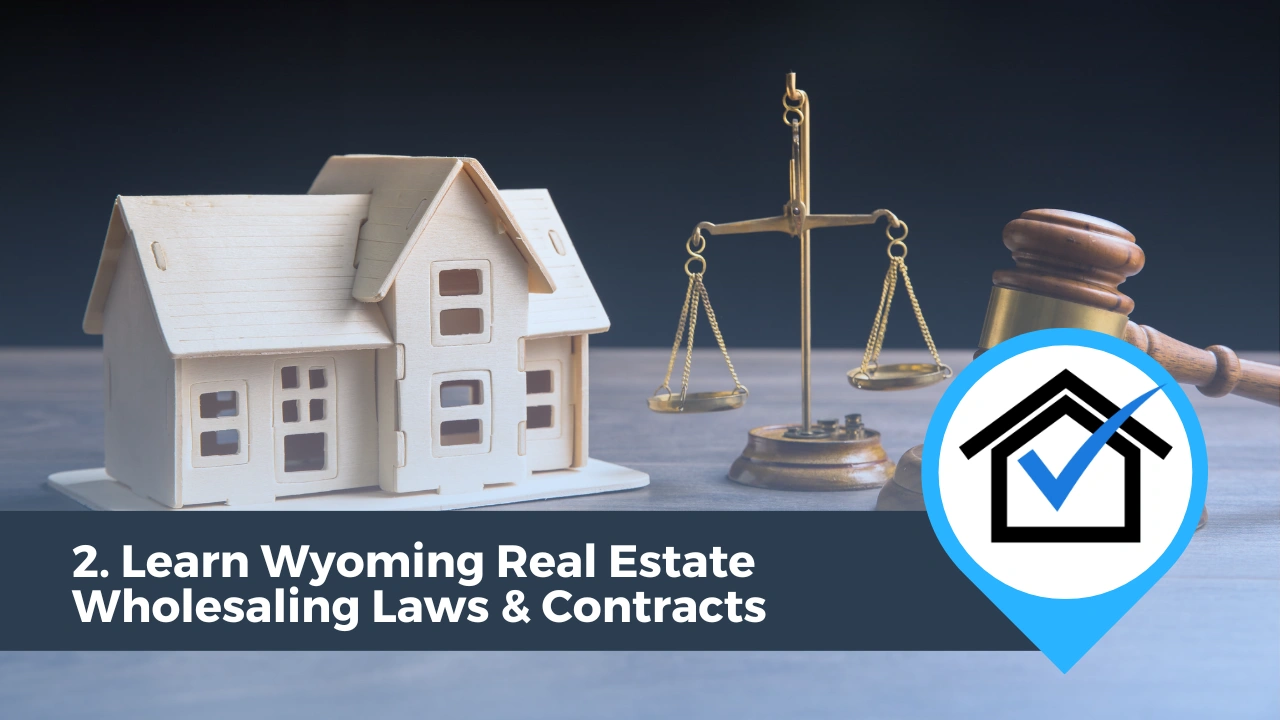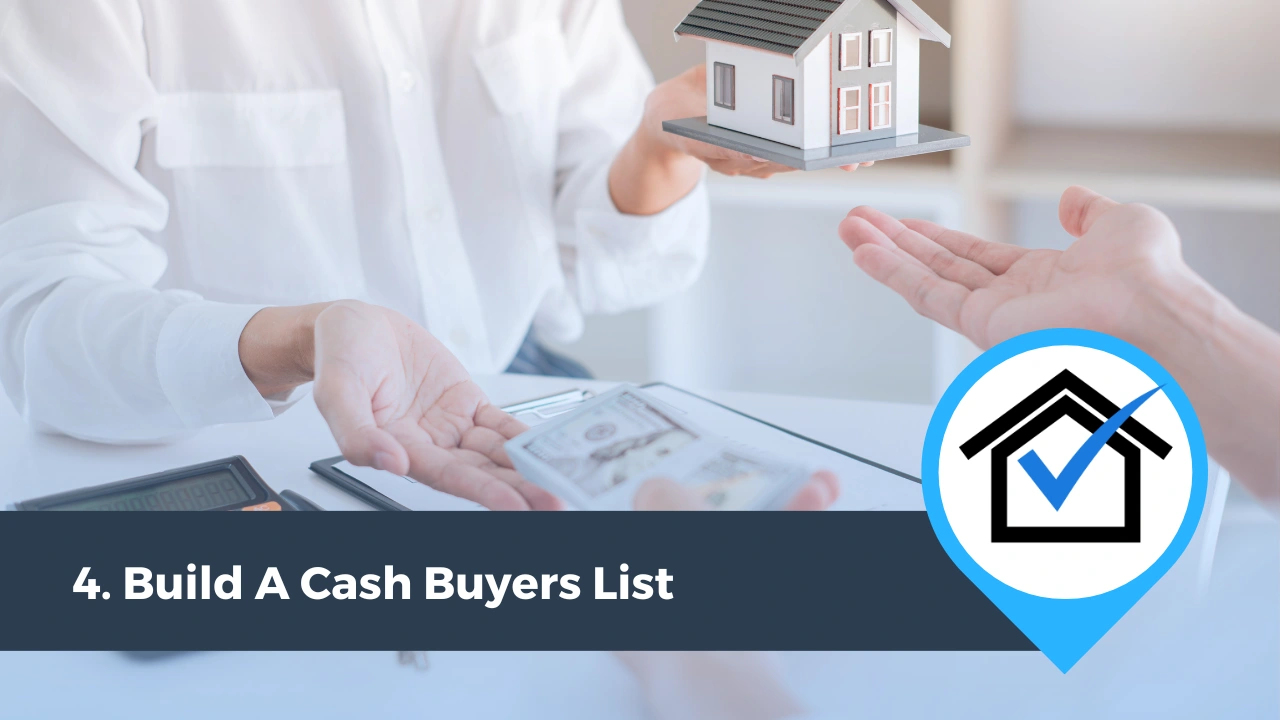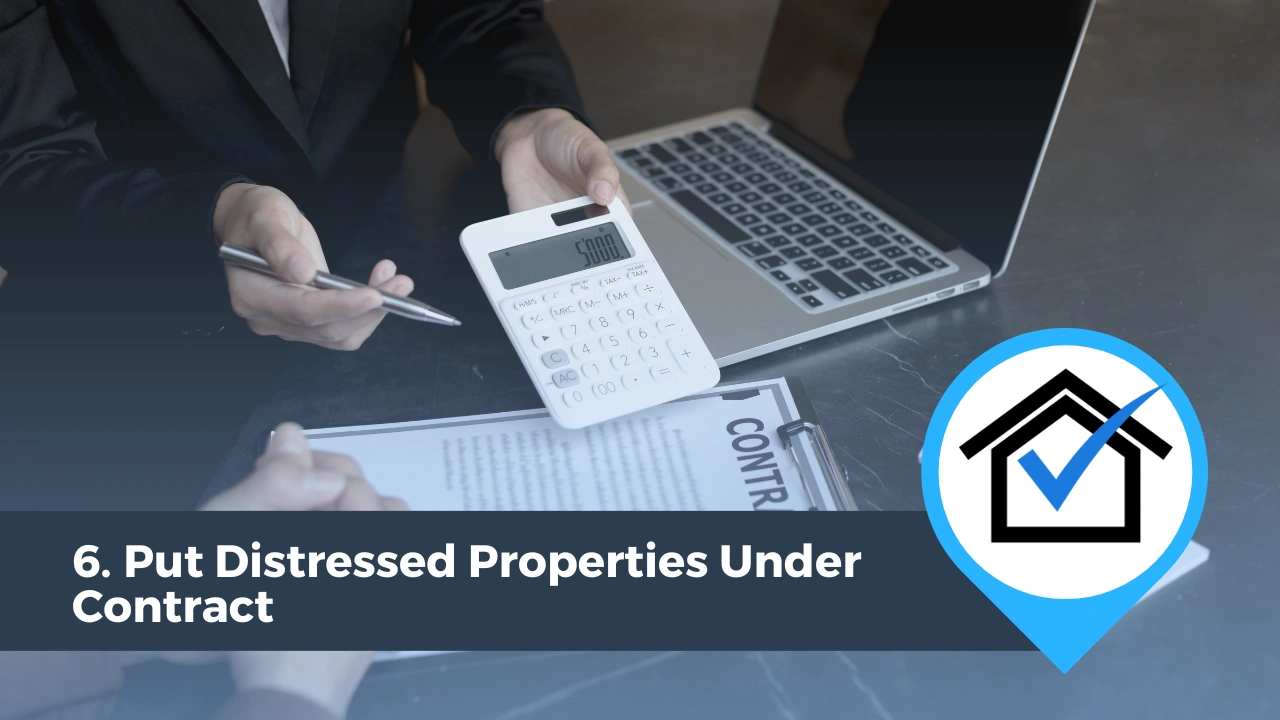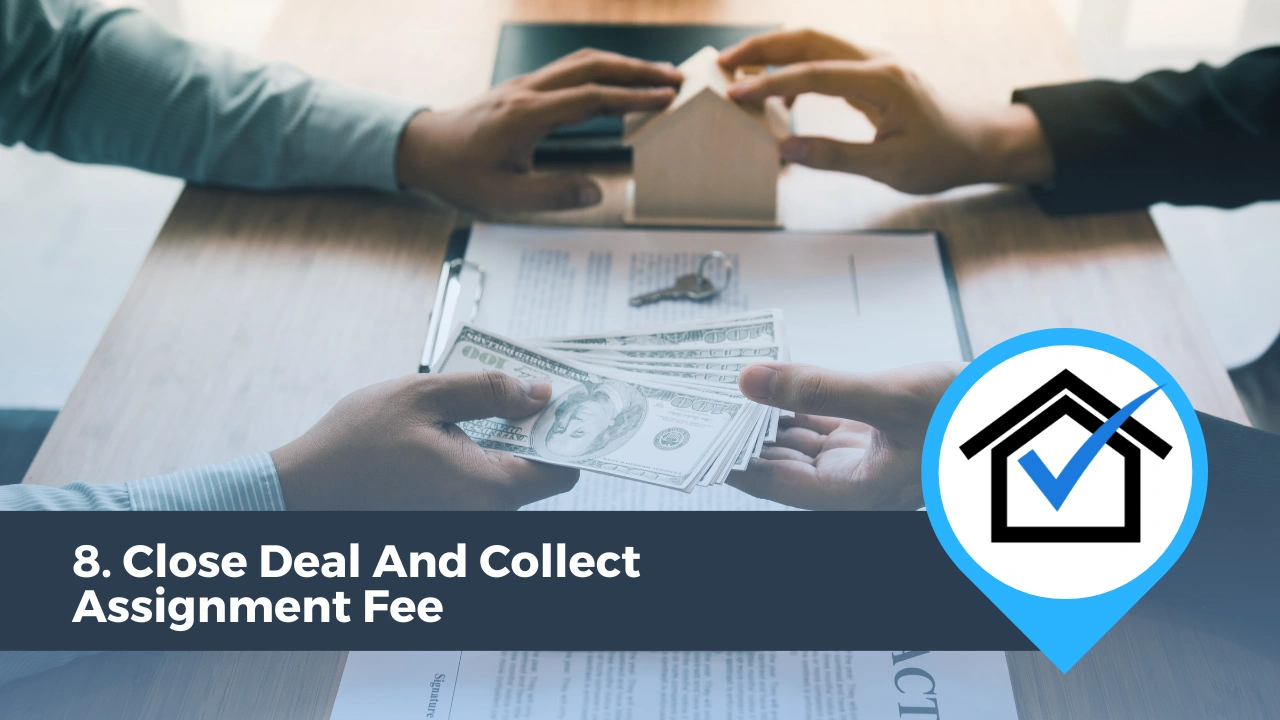
How To Wholesale Real Estate In Wyoming: Step-By-Step (2025)
Feb 24, 2025
Wyoming is home to some of the most beautiful landscapes in the United States. Tourists from across the country and world come every year to bask in the remarkable sceneries, visit the national parks, and enjoy skiing, hiking, and all sorts of outdoor activities. But, what if we told you that Wyoming is more than just a state for visitors and tourists to enjoy their time off? What if we told you that the state is actually filled with tremendous real estate opportunities for long-term wealth creation?
According to the latest census, Wyoming has a population of just over 584,057 people. Of those 584,057 people, the majority live in an owner-occupied house. This spells tremendous opportunity for real estate investors.
As you’ll learn more about in this article, wholesale investing works exceptionally well when there’s a market for fix and flip investors looking to ultimately offload their properties to owner-occupied homeowners. In Wyoming, though the majority of people traveling throughout the state are visitors, the actual residents of the state are primarily homebuyers and not renters.
These individuals will likely be more amenable to the price they pay for their dream family home. For the wholesale investor and fix and flip investor, this could mean more profits, higher demand for housing, and more attractive investment opportunities.
In this article, we’ll teach you how to profit off this trend and specifically how to wholesale real estate in Wyoming.
- What Is Wholesaling Real Estate?
- How To Wholesale Real Estate In Wyoming (9 Steps)
- Is Wholesaling Real Estate Legal In Wyoming?
- How Much Do Real Estate Wholesalers Make In Wyoming?
- Do You Need A License To Wholesale Real Estate In Wyoming?
- Is Wholesaling In Wyoming Easy?
- Final Thoughts On Wholesaling In Wyoming
Ready to Take the Next Step in Real Estate Investing? Join our FREE live webinar and discover the proven strategies to build lasting wealth through real estate.
Whether you're just getting started or ready to scale, we'll show you how to take action today. Don't miss this opportunity to learn the insider tips and tools that have helped thousands of investors succeed! Seats are limited—Reserve Your Spot Now!
*Before we begin our guide on how to wholesale real estate in Wyoming, we invite you to view our video on How To Wholesale Real Estate Step by Step (IN 21 DAYS OR LESS)!
Host and CEO of Real Estate Skills, Alex Martinez, provides a comprehensive, step-by-step guide for beginners to start wholesaling real estate!
What Is Wholesaling Real Estate?
Wholesaling real estate is a real estate strategy that is a mix between real estate investing, matchmaking, and house flipping. Though it is a strategy that requires very little capital, it can be extraordinarily lucrative.
The way it works is that an individual connects homeowners with cash buyers in exchange for a fee. Generally, wholesaling deals specifically with distressed properties and motivated sellers, but that isn’t always the case.
Once the wholesaler finds the right property, he or she goes under contract, connects with his or her cash buyer, assigns the contract over to them for a fee, and allows the end-buyer to do the actual fix and flip. Wholesalers love the strategy because they retain a fee without taking on the risk of flipping the house and fix and flip investors love the strategy because they are still able to flip the house for a profit without having to focus on sourcing the deals.
A truly successful wholesaler will sift the Multiple Listing Service (MLS), foreclosure auctions, and other websites. The more contacts you initiate, the higher likelihood you’ll be able to find a great deal to profit off of.
Read Also: How to Start Investing in Real Estate with No Money
How To Wholesale Real Estate In Wyoming (9 Steps)
In the following nine steps, we’ll show you how to wholesale properties in The Equality State. Be sure to check out our in depth video showing you how to wholesale real estate step by step here:
With that in mind, here's our simple step by step process for wholesaling real estate in Wyoming:
- Partner With A Wholesale Mentor
- Learn Wyoming Real Estate Wholesaling Laws & Contracts
- Understand The Wyoming Real Estate Market & Lingo
- Build A Cash Buyers List
- Find Motivated Sellers & Distressed Properties
- Put Distressed Properties Under Contract
- Assign The Contract To Cash Buyer
- Close Deal And Collect Assignment Fee
- Double Close Or Wholetail When Necessary
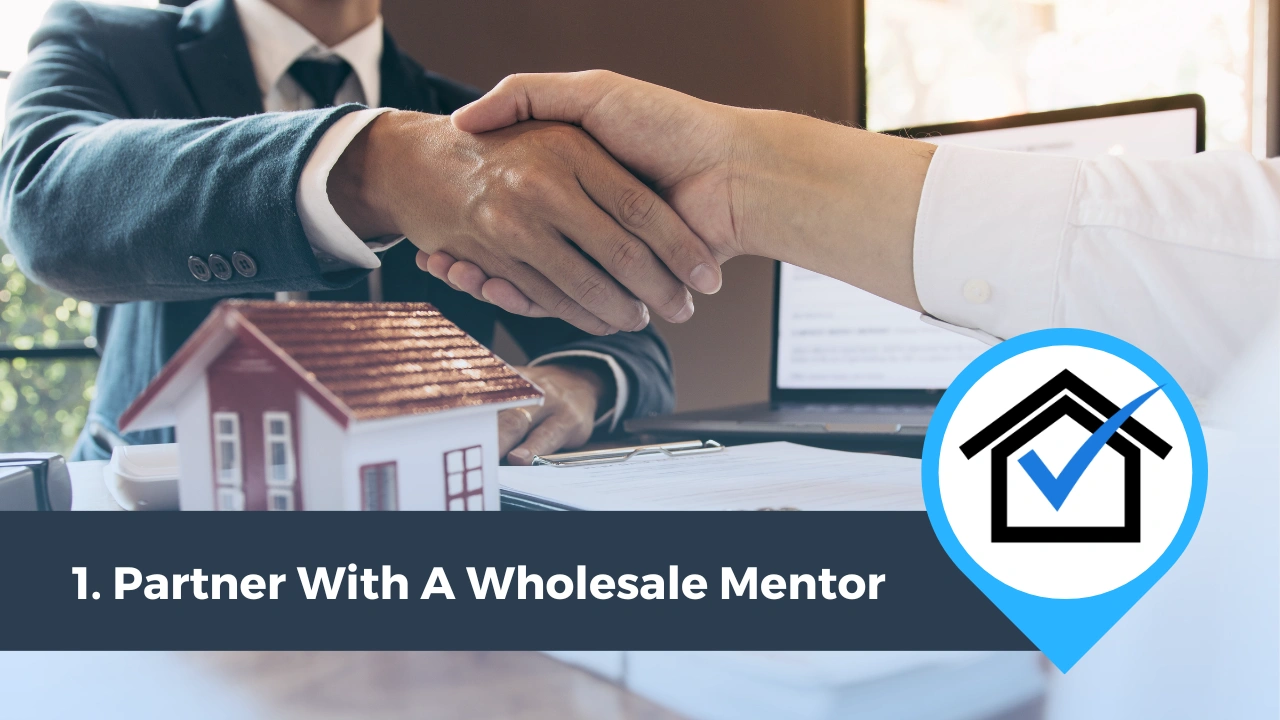
1. Partner With A Wholesale Mentor
The first step in your journey as a wholesaler is to find a local real estate wholesale mentor. Mentors are individuals with capital, experience, and market knowledge. They know the ins and outs of the industry and will be able to help you navigate the Wyoming market to help you minimize the number of mistakes you could potentially make.
They’ll put you in touch with the right cash buyers, they’ll get you into local networking events, and they’ll be able to teach you how to properly analyze a potential investment. By reaching out to these mentors and relying on their advice you’ll be able to avoid mishaps and learn how to work more efficiently than your competition.
Read Also: How To Build A Real Estate Network | Wholesaling & Flipping Houses
2. Learn Wyoming Real Estate Wholesaling Laws & Contracts
After you’ve set aside a mentor to help guide you through your journey, you’ll want to familiarize yourself with wholesaling laws and contracts. The best place to start is glossing through the Wyoming Real Estate Commission (WREC) website and reading the Wyoming real estate licensing requirement laws and regulations. Though as a wholesaler you won’t need a real estate license (more on that later), you’ll want to know laws and contracts pertaining to all aspects of the real estate industry.
The Wyoming Real Estate Commission is the state agency responsible for issuing, administering, and managing real estate licenses, brokerages, and overall general market activity in Wyoming [WS 33-28-105]. The Wyoming laws governing real estate are found in Title 33, Chapter 28 – Real Estate Brokers and Salespersons. By reading through these laws you’ll ensure you have a broad understanding of how to operate a real estate business within the confines of state law. The last thing you want is to unknowingly break the law. So, be sure to thoroughly read these resources before wholesaling your first deal.
Remember, wholesaling real estate is selling the equitable interest in a purchase agreement. It is not selling or marketing the actual property itself. According to Section 33-28-103, individuals who own, manage, or are the trustee/attorney representing an owner of real estate do not need a license.
A wholesaler, an individual essentially acting as a middleman, would fall under that exemption and not need a license. However, once you start publicly marketing the property or getting a brokerage commission on behalf of an owner for the sale of a property, you could be subject to disciplinary actions and fines if you aren’t licensed.
After you’ve glossed through some of the laws and regulations, you should then sit with an attorney and go through the standard Wyoming Purchase and Sale Agreement. Since you’ll be going under contract using this document, you should familiarize yourself with all of your rights, obligations, and liabilities. Your mentor could also sit down and walk you through the contract in more detail.
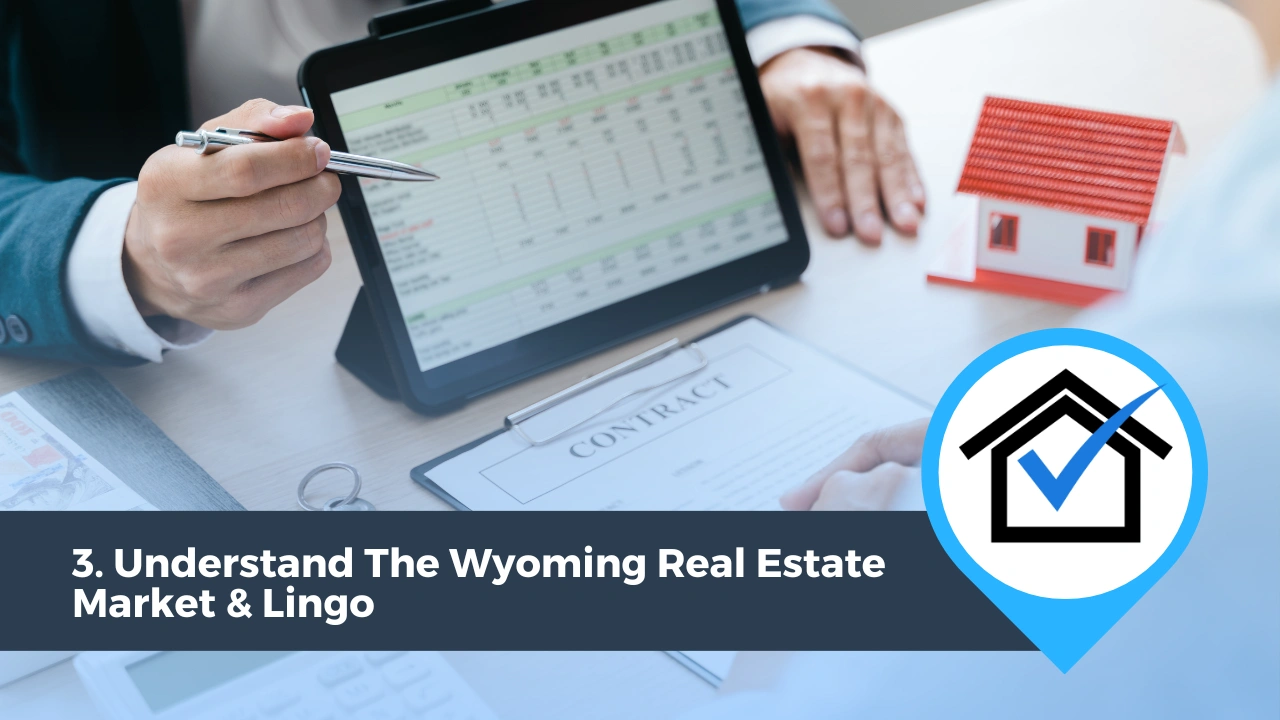
3. Understand The Wyoming Real Estate Market & Lingo
Next, you’ll want to understand the Wyoming real estate market and lingo. The best place to get a true understanding of the Wyoming real estate market is by surfing through each city’s respective realtor association website. These organizations offer numerous courses, resources, contacts, and information you’ll find super helpful in determining which submarkets to invest in and how to properly do it.
The five biggest cities in Wyoming are Cheyenne, Casper, Laramie, Gillette, and Rock Springs and here are a handful of websites pertaining to these submarkets:
- The Wyoming Association of REALTORS (WAR)
- The Casper Board of REALTORS (CBR)
- The Laramie Board of REALTORS (LBOR)
- The Northeast Wyoming REALTORS Alliance (NEWRA)
Work with your mentor to determine which submarket has the most attractive real estate market for fix and flip investors and residential homeowners. You might want to consider walking through the various neighborhoods, speaking to local residents, and calling appraisers, general contractors, and real estate attorneys to pick their brains a bit.
Read Also: Wyoming Real Estate Classes: Wholesaling, Flipping & Licensing
4. Build A Cash Buyers List
After you attain the requisite knowledge needed to start your wholesaling process, you’ll want to build a cash buyer list.
A cash buyer list is a list of investors that have the liquidity necessary to close on a transaction very quickly. This list is a vetted compilation of investors that you know are interested in the properties you are looking at.
The best way to compile this list is to network, send postcards, reach out to individuals on social media, and cold-call investors in your region. Perhaps you can also tap into your mentor’s cash buyer list as well.
You can also check out this video on how to find cash buyers!
Then, once you go under contract with a seller, you’ll want to already have a cash buyer in mind that could be interested in purchasing your contract quickly.
Having strong buyers that are ready to move fast is key to wholesaling houses successfully.
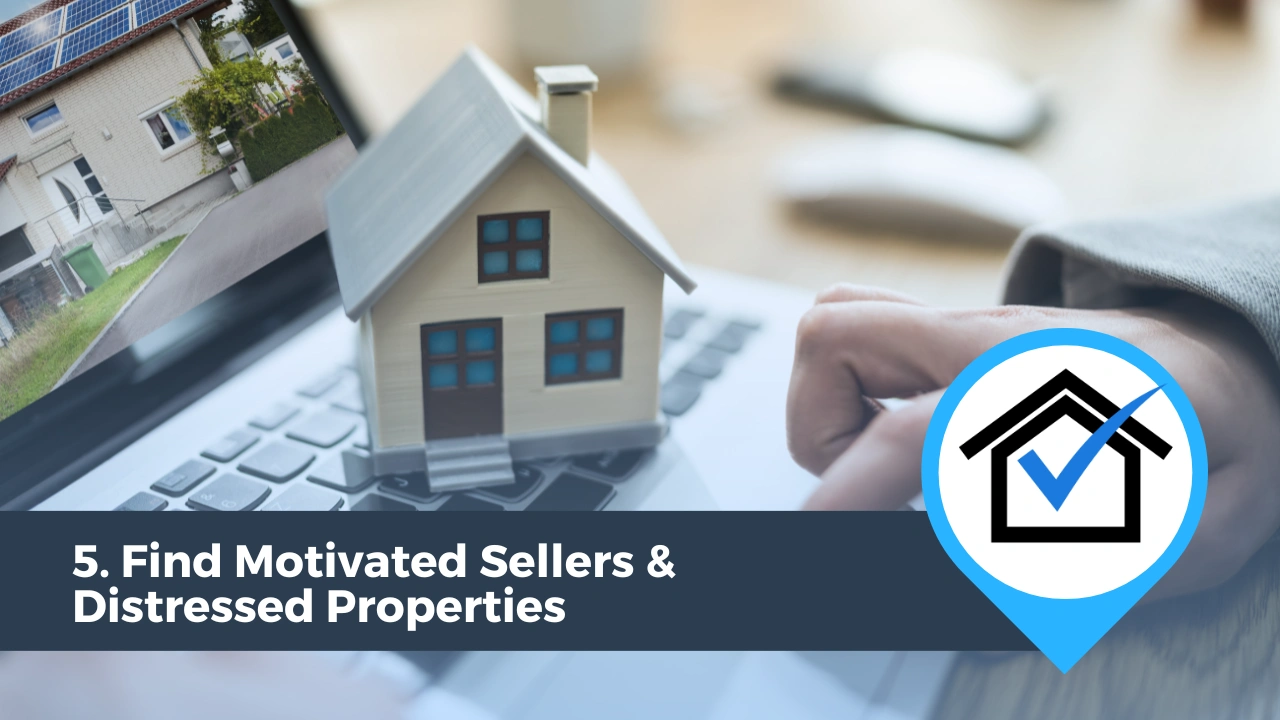
5. Find Motivated Sellers & Distressed Properties
The opportunity for success within the real estate market in Wyoming is incredible, but where is the best place to look? The answer lies in distressed properties and ones sold by motivated sellers.
A distressed property is a property that needs renovation. These properties come in all shapes, sizes, and colors, but are generally found in foreclosure auctions or “as-is” on brokerage sites like Zillow. These types of properties are perfect for fix and flip or rental property investors on your cash buyer list. They trade at a discount to the surrounding market and, with some care, can have their value unlocked considerably. Locate these properties - either on or off market - and go under contract with their sellers very quickly. Then, once you’ve secured the property, you’ll be able to flip the contract over to a different investor for a higher price.
The other source of opportunity is homes sold by motivated sellers. These individuals own their property, but need to sell badly. They’d rather sell their property quickly for a below-market value to a wholesaler rather than in a formal process with a real estate agent in an open market transaction. It’s a win-win scenario because the wholesaler offers the seller a great deal by closing all cash very quickly, and the seller offers the wholesaler a great deal by handing over a property at an attractive price.
Read Also: Finding Motivated Seller Leads: Free & Paid Tactics
6. Put Distressed Properties Under Contract
For this part of the wholesaling process, you’ll want to calculate the after-repair value (ARV), estimate repair costs, and use the maximum allowable offer (MAO) formula.
The ARV is the value of a property after an owner fixes it up and brings it back on the market. Calculating this figure is essential to the wholesaling process and will help you determine if you and your buyer will end up making money on the transaction. It’ll also be used to help you determine the proper price to offer on a particular home.
To calculate the ARV, you’ll want to search the MLS and other brokerage sites to determine what other properties of similar configuration have recently sold for. Confirm your data with professionals in the industry such as real estate brokers and your mentor. Then, once you come up with a value, it’s time to estimate rehab costs. Speak to general contractors and be sure to give yourself some wiggle room on your calculation so you don’t break the bank more than you expected.
Watch this video to learn how to confidently fill out real estate contracts and secure your deal.
Then, after you’ve calculated the ARV and have estimated the budget needed to achieve that value, you’ll need to add your wholesale fee and fix and flip desired profit. It is up to you to plug and play with the figures to get to an MAO that is both aggressive enough to win the deal, but conservative enough to protect you on the downside.
Before you determine your MAO, let's look at how to lock in that property.
Here is what the formula looks like:
MAO = ARV - Rehab Costs - Holding Costs - Wholesale Fee - Investor Profit\
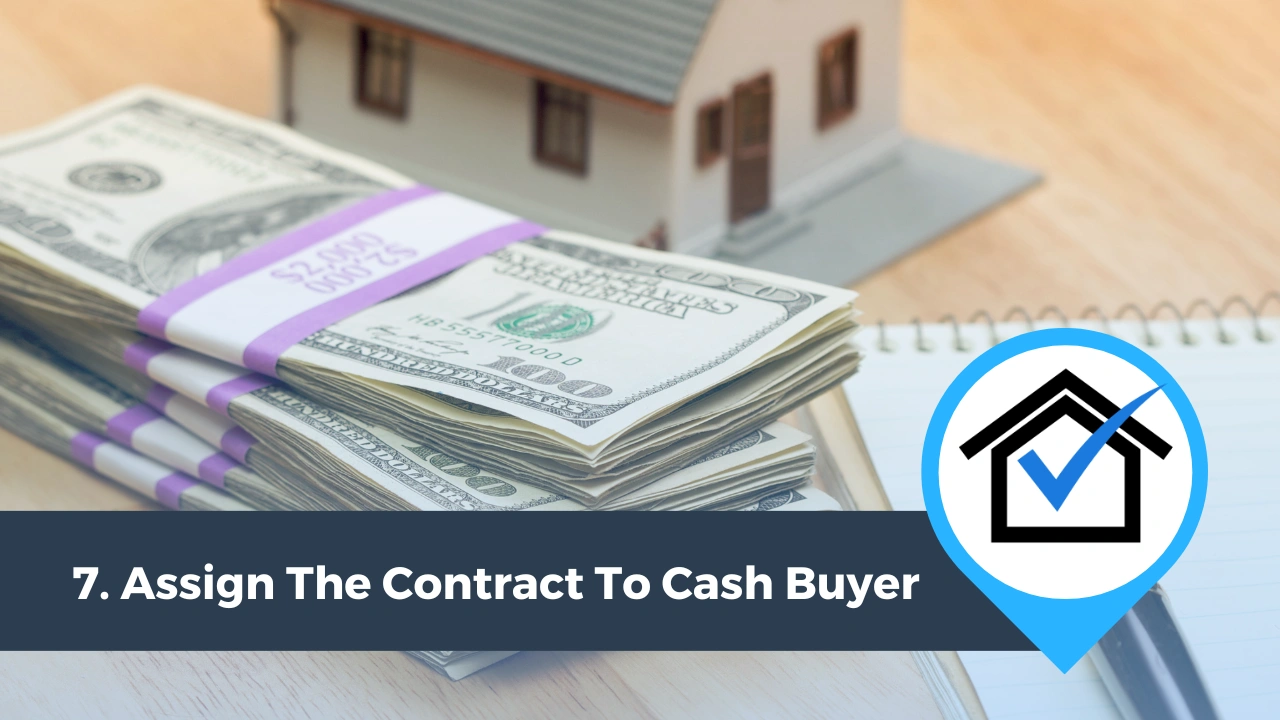
7.Assign The Contract To The Cash Buyer
Now, it’s time to assign the contract over to a cash buyer. This contract is the end-all and be-all for the wholesaler.
Without it, you won’t be able to make your wholesale fee and transfer the equitable right to the purchase agreement to a new buyer. Be sure to bake in your wholesale fee and ensure your liabilities are covered.
Perhaps spend some time going over the contract with your attorney before sending it to your cash buyer.
Read Also: Wholesale Real Estate Contract: The (Ultimate) Guide
8. Close Deal And Collect Assignment Fee
After you assign the contract to your end-buyer go ahead and collect your assignment fee.
Once the cash buyer pays you your fee it’s time to get the ball rolling again and go source a new property to wholesale.
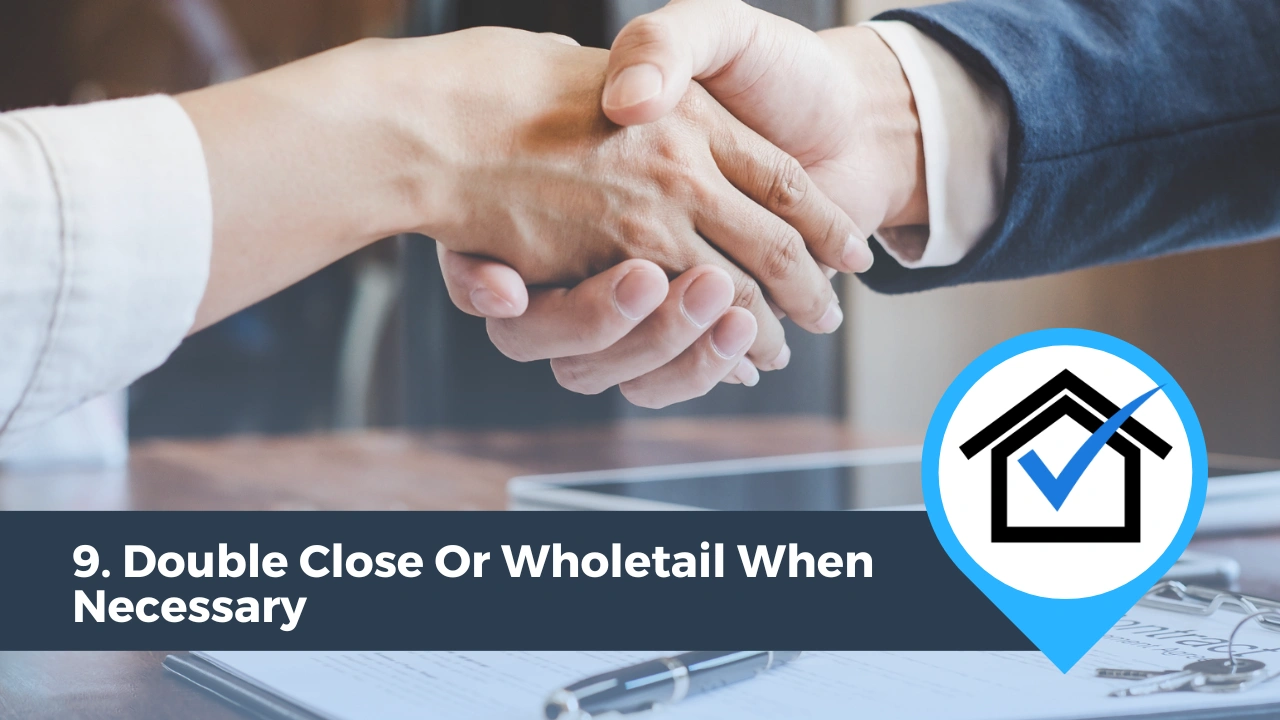
9. Double Close Or Wholetail When Necessary
There are a number of different variations to wholesaling you might want to consider. As a wholesaler, no two deals are equivalent. Having a variety of methods, strategies, and creative ideas could boost your wholesale volume considerably. Two such examples are a double close and wholesaling.
A double closing is a type of transaction where you forgo the need for an assignment contract entirely and instead close on two transactions at the same time. Hence the name double closing.
For this strategy, you’ll go under contract with the seller and then simultaneously go under contract again with a different buyer that you’ve sourced at a slightly higher price. You’ll then coordinate with the title insurance company to facilitate both closings at the same time and, as a result, you’ll keep the difference of the two prices instead of the traditional wholesale fee.
There is a chance you’ll undergo some pushback from lenders and title agencies during a double close. Some companies want to see one transaction close at a time rather than facilitate two closings at once with three different parties. In order to avoid this, some investors use hard money loans or transactional funding to ensure they can close on the two deals at once without any major setbacks.
One drawback to the double-closing strategy is that it can be a bit more expensive than a standard wholesale deal. You could end up paying legal fees twice, recording taxes twice, and other traditional closing costs both as a buyer and then again as a seller. Nonetheless, it’s a strategy you should consider depending on the situation.
Wholetail is another creative wholesaling strategy you might want to consider.
Wholetail is a combination of a fix and flip and a standard wholesale deal. The difference is that in wholesaling, you’ll take ownership of the property, do some light, yet high return on investment (ROI) renovations, and then re-list the property shortly thereafter on the market.
Although you put some extra capital into the project, by re-listing the property on the MLS with a licensed broker, you’ll get access to home buyers with financing that aren’t as price sensitive as cash buyer investors. Wholesaling also gives you some extra time to allow your property to rise in value if market conditions aren’t tremendously favorable when you initially purchased the property.
*For in-depth training on real estate investing, Real Estate Skills offers extensive courses to get you ready to make your first investment! Attend our FREE Webinar Training and gain insider knowledge, expert strategies, and essential skills to make the most of every real estate opportunity that comes your way!
Is Wholesaling Real Estate Legal In Wyoming?
Yes, wholesaling real estate is legal in Wyoming. As mentioned earlier, be sure to familiarize yourself with wholesaling laws and regulations. Though you don’t need a license to wholesale in Wyoming, you should still be aware of some of the courses, fees, and laws real estate professionals need to abide by in the state.
But, rest assured, wholesaling is completely legal as long as you act within the legal exemptions that steer you clear of Wyoming real estate licensing law.
How Much Do Real Estate Wholesalers Make In Wyoming?
There is no set salary wholesalers make per transaction or per year. However, as you continue your wholesaling journey and start working with various investors and cash buyers, you’ll come to realize that you can charge an attractive fee.
Though the ultimate fee you charge will likely depend on the type of transaction, the discount you obtain to market value, and your property’s ARV. You could also shift your fee up or down based on the amount of time you spend on the transaction.
Read Also: Wholesale Real Estate Salary: How Much Can You Make Wholesaling?
Do You Need A License To Wholesale Real Estate In Wyoming?
No, you don’t need a license to wholesale real estate in Wyoming. However, it might be a good idea to get a license anyway.
As a licensed agent, you’ll get access to a number of resources that could potentially also help with your wholesale business. Brokers get access to the MLS and exclusive networking events. They also can market their properties publicly and charge commissions for brokering out deals. Having access to these resources can be tremendously helpful for you.
Read Also: Can A Realtor Wholesale Property? The (ULTIMATE) Guide
Is Wholesaling In Wyoming Easy?
No, but it can be easier with the right coach, a mentor, and the proper training. At Real Estate Skills, we offer a phenomenal program called the Pro Wholesaler VIP Program. This step-by-step wholesaling program will teach you the ropes and help you start and grow your own wholesale real estate business.
The Pro Wholesaler VIP Program is designed for the modern entrepreneur to learn the basics and how to help new real estate wholesalers avoid the pitfalls typically found by beginners. It is 100% online and is used for local and virtual real estate wholesaling.
Whether you’re looking to generate hundreds of thousands in wholesale fees, acquire your first rental property, or fix and flip deals like a pro, Real Estate Skills has your back. Like anything in life, wholesaling takes work and time. If you put in the hours, make the calls, and do your research, you’ll inevitably become successful in the investment business.
Final Thoughts On Wholesaling In Wyoming
If you are looking for real estate deals and investment property to wholesale or flip, look no further than the state of Wyoming. Many people think the best states for flipping houses are New York or Michigan, but in truth, Wyoming has tremendous opportunities across all types of real estate.
Becoming a residential or commercial real estate flipper is no simple task, but with the right education and mindset, you can become extremely successful. Learn about real estate contracts, check out our YouTube channel, listen to podcasts, understand how liens on off-market properties work, and secure good real estate financing.
Ready to Take the Next Step in Real Estate Investing? Join our FREE live webinar and discover the proven strategies to build lasting wealth through real estate.
Whether you're just getting started or ready to scale, we'll show you how to take action today. Don't miss this opportunity to learn the insider tips and tools that have helped thousands of investors succeed! Seats are limited—Reserve Your Spot Now!
*Disclosure: Real Estate Skills is not a law firm, and the information contained here does not constitute legal advice. You should consult with an attorney before making any legal conclusions. The information presented here is educational in nature. All investments involve risks, and the past performance of an investment, industry, sector, and/or market does not guarantee future returns or results. Investors are responsible for any investment decision they make. Such decisions should be based on an evaluation of their financial situation, investment objectives, risk tolerance, and liquidity needs.

